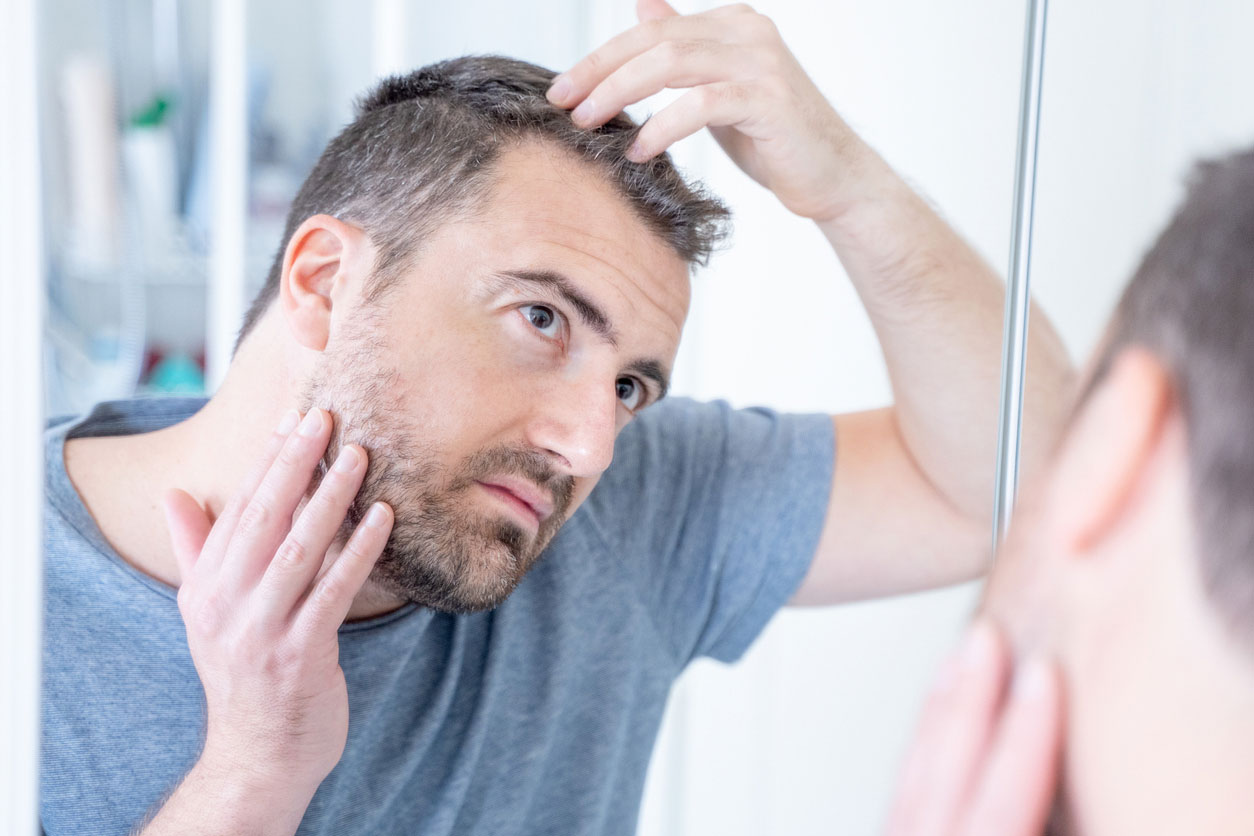Scalp psoriasis is a chronic autoimmune disease that affects at least 3 million people in the United States. This inflammatory response to internal or environmental triggers results in dry, raised, itchy plaques that can be unsightly and uncomfortable. Psoriasis isn’t contagious, but it can negatively affect your health and self-confidence. When you have this condition, it’s important to care for yourself and keep your spirits up. If a psoriatric scalp disorder affects the way you relate to other people, you can improve your quality of life by learning how to manage your condition.
iStock.com/tommaso79
What Are the Causes of Scalp Psoriasis?
Most people have a skin regeneration cycle that produces new cells around once a month. For people with psoriatric scalp disorders, skin cell growth accelerates so quickly that each cycle lasts only three to four days. These new cells create a patchy, scaly buildup of skin on and around your scalp. Hereditary factors, sun exposure, medications, stress, and other inflammatory disorders can all contribute to scalp psoriasis. People who consume alcohol, use tobacco, or suffer from depression or obesity may also be likely to suffer from this condition.
What Are the Symptoms of Scalp Psoriasis?
People who suffer from a psoriatric scalp condition may experience a range of mild to severe symptoms. Mild symptoms may include scaly skin or flaking that resembles dandruff. More severe symptoms may manifest as reddish, purplish, or brown plaques with a white or silvery layer of dead skin cells that appear on your scalp, hairline, and forehead. You may also find plaques on the back of your neck or the skin around your ears. In extreme cases, psoriasis of the scalp can cause skin fissures, bleeding, and hair loss.
What Kinds of Treatments Help Heal Scalp Psoriasis?
Psoriatric scalp disorders can look similar to other scalp disorders like seborrheic dermatitis, eczema, and some fungal infections. If you suspect that you have scalp psoriasis, see your healthcare provider for a diagnosis and appropriate treatment. Your doctor may examine your skin and ask questions about your symptoms, family history, diet, and any medications or hair products you are using. Blood tests, biopsies, and allergy tests may also be administered to screen for the causes of your symptoms.
Change Your Diet
Once your psoriatric scalp condition has been diagnosed, your doctor will prescribe treatments to help you manage and improve your symptoms. Psoriasis can’t be cured, but its effects can be minimized. If your symptoms are mild, you may be able to treat them with over-the-counter medications, home remedies, and adjustments to your lifestyle. Your doctor may suggest an elimination diet that helps you rule out foods that trigger flare-ups. Alcohol, dairy, citrus fruits, gluten, and nightshade fruits and vegetables are known to cause inflammation in many people. Fortunately, other foods, like leafy greens, oily fish, and olive oil, have anti-inflammatory properties that may help your condition.
Care For Your Scalp and Skin
Treat your scalp gently; hot water can inflame your skin. Take short, lukewarm showers or baths. When you wash your hair, use a scalp oil or conditioner that will keep your scalp moisturized without causing irritation or an allergic reaction. Comb your hair carefully, and treat your plaques or scaly patches with the appropriate cream, ointment, or gel. Let your scalp breathe; don’t cover your head with anything that could trap heat or moisture or cause your scalp to sweat.
Try Topical Treatments
Over-the-counter and prescription creams, lotions, and gels are likely to be part of your treatment plan. Your doctor may suggest a regimen including a corticosteroid, salicylic acid, coal tar, or anthralin used alone or in combination as part of your skincare regime. Taking oral antihistamines can also help calm your skin and reduce itchiness. Topical home remedies like aloe vera, coconut oil, and olive oil may help provide relief. These natural balms can help calm, hydrate, and moisturize your skin, but they may not be a good replacement for medication. Speak to your doctor if you experience a sensitivity to any of these treatments.
Learn About Advanced Therapies
If your case of scalp psoriasis does not respond to topical medications and dietary adjustments, your doctor may suggest more powerful therapies. Immunosuppressive drugs or tumor necrosis factor (TNF) inhibitors may be injected into your plaques to reduce their size. Oral medications may include immunosuppressive treatments and drugs that regulate skin cell growth. Less invasive measures include phototherapy, which uses a lamp to deliver ultraviolet (UV) light waves toward affected areas. All of these therapies have the potential to cause complications or side effects, so it is important to maintain your health outside of these therapies.
Seek Help to Manage Your Psoriatric Scalp Disorder
Psoriasis can be difficult to treat, and people respond differently to available solutions. Be patient and positive as you work with your healthcare providers to find the treatment that works best for you. It may take several weeks for your psoriasis to improve, but with proper care, you are very likely to gain control of your condition. The prognosis for treating psoriatic scalp conditions is good, so don’t hesitate to seek help if you need it.

